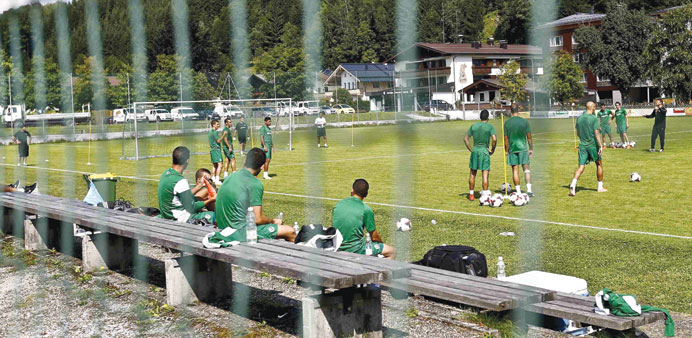|
A football match to be played in Austria today by Maccabi Haifa and Paderborn has been moved to a new venue due to security concerns after a violent anti-Israel protest disrupted the Israeli team’s last game in the Alpine republic. |
The match will now take place in the town of Leogang in Salzburg province, where Maccabi Haifa’s training camp is located, after the town of Kirchbichl, about 60 kilometres (37 miles) away, refused to host the game for security reasons.
Protesters against Israel’s military offensive in Gaza invaded the pitch and attacked Maccabi Haifa players at a friendly game against Lille on Wednesday in the Austrian town of Bischofshofen, causing play to be abandoned. Around 20 youths of Turkish origin ran onto the pitch with Palestinian flags and anti-Israeli placards, police said.
Hannes Empl, head of the SLFC organisation that hosts football training camps in the Salzburg region, said yesterday the players were slightly tense but ready for the match to go ahead as normal. “They’ve been coming here to train for 10 years and they’ll be coming back next year,” he told Reuters by telephone, adding that the team would be leaving tomorrow.
Violent protests against Israel’s military intervention in Gaza, in which more than 800 people have died, have also been marred by anti-Semitism in France and Germany. In Austria, which was annexed by Adolf Hitler in 1938 and where anti-Semitism still lingers below the surface, the football protest was sharply condemned by politicians from all sides as well as by the leader of the Jewish community in Vienna.
“There can be zero tolerance in Austria of violence motivated by religion or anti-Semitism,” said Foreign Minister Sebastian Kurz of the conservative OVP party. Political scientist Thomas Schmidinger said the protest was a symptom of a recent Islamicised form of anti-Semitism that has been given new life by the Gaza conflict.
“One can combine the old-fashioned anti-Semitism wonderfully with the new anti-Semitism,” said Schmidinger, a Middle East specialist at Vienna University. But he said the area where the violent protest took place had known problems with right-wing Turkish youths and was one of a few such pockets in Austria, and urged that the official reaction be proportionate.
“It seems to me that it was not a big concerted action but probably down to local youths,” he said. “I find it a bit overdone that the game has been cancelled. I think it’s the wrong signal to react like that.”

